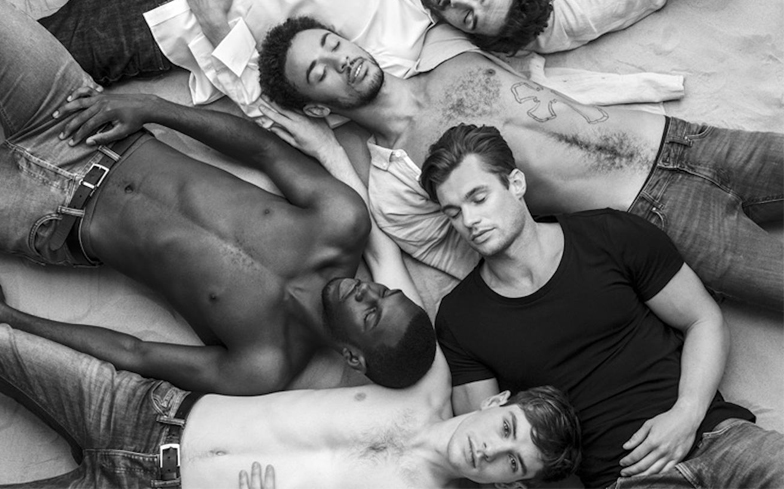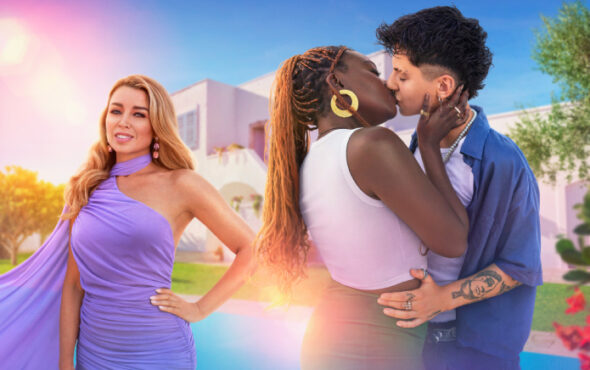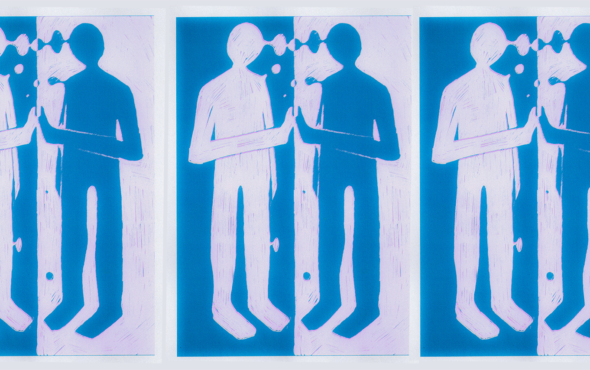
Asked if he thinks there are enough queer stories being told in the arts, dramatist Matthew Lopez declares: “We always need more. We need more of everything. We need more trans stories being told, we need more stories being told by gay women… There is no such thing as too much representation.”
Meeting with us at The Young Vic as the matinee performance of the first part of his two-part The Inheritance is playing to a packed house, the American writer adds: “I don’t think we need fewer of these stories and more of those stories. We need more stories, period. I long for the day when we feel the market is saturated. We haven’t gotten there yet and we’re not nearly close to it, but that will be a wonderful day when it comes.”
Matthew is certainly doing his bit for the cause. The Inheritance is a seven-hour epic that covers the whole gamut of gay men’s lives with humour, wit and insight, tackling big themes (HIV and AIDS, politics, community, sex, open relationships) across a dazzlingly Stephen Daldry-directed intergenerational narrative. When we meet, he’s all smiles and understandably so, given the across-the-board praise for a staggering work that saw the seeds of its germination when he was 14 years old and saw the film of Howards End for the first time.
“It moved me in ways I hadn’t experienced from watching a film before, especially one that was so foreign to my life,” Matthew says of the big screen adaptation of E. M. Forster’s 1910 novel about English mores and moralities. “There was nothing about that story that would have seemed to relate to me as a young kid in the Florida Panhandle, 100 years later. I fell in love with the story and I read the book and loved it.”
Fast forward to 13 years later when a 27-year-old Matthew was living in New York, reading the book for the umpteenth time. It was a new reprinting with a Forster biography in the back and Matthew, in the days before Wikipedia, was surprised to learn the author was gay. “Suddenly it made sense to me why I loved it so much. Everything just clicked into place. Around that time, in that moment actually, I knew I wanted to redo Howards End as a gay man might have told that story.” He corrects himself. “I mean, a gay man did tell that story but I wondered what Forster’s writing would have looked like if he’d been allowed to tell his story on his own terms.”

© Simon Annand
Matthew sat on the idea for many years, bringing it to various theatres amongst a bunch of other ideas, but the other ideas always got picked and The Inheritance didn’t – but he didn’t feel ready to flesh it out anyway. “It was an idea that was sitting around in my brain and I couldn’t shake it, but I also didn’t really know what to do with it.”
Fast forward another seven or eight years. “I’d lived more of a life and had more experiences, more heartbreak, and I knew I was finally ready to write it. I didn’t think it would be a two-part, seven-hour play, I was just doing a riff on Howards End, telling the story in a contemporary setting using gay men.” HIV and AIDS play a prominent part in the narrative. “You can’t tell the story of gay men’s lives at the end of the 20th century without talking about HIV and AIDS,”
Matthew explains. “When I was 14 and the movie of Howards End came out the epidemic hadn’t subsided. It was about to subside but we didn’t know that so I came of age knowing I was gay and being taught, both through the news and the community I grew up in, that being gay was a death sentence.
“It took me a while to figure out why I wrote the play. Being a gay man was both the most joyful thing that happened to me and also the most traumatic thing that happened to me – being told that who I was was risking death and that sex was never going to be something purely pleasurable but would always carry with it a twinge of mortal danger. I needed to deal with the trauma, to face it and understand it, in order to live in the joy.”
One of the play’s key themes is that we must learn from our collective past. “It’s important for every culture to understand its heritage. We talk in the play about how African Americans teach their children about Jim Crow, Civil Rights and even slavery going back 150 years, and beyond. You have to understand the past in order to navigate the path you’re on. It’s about asking gay men to acknowledge their legacy that has been left to them by previous generations of gay men. It’s vital to know that HIV and AIDS did happen to us and that it was no less traumatic to our community than any other traumas that have been inflicted on communities which are then memorialised by those communities. We have our own trauma and it’s inherited.
“It’s important to remember what happened to us and what was allowed to happen to us and what our community did in response to it. We decided as a community, with our allies, that we would not be left to die – that we would save our own
lives. With any luck, there will not be another calamity such as the calamity faced by gay men in the 80s and early 90s, but there will always be another calamity. Life is the silence between the chaos.”

© Simon Annand
Another theme, and one that isn’t often explored, is that the older generation can learn a lot from the younger one. As a man in his early 40s, Matthew has learned so much about bravery from LGBTQ youth. “I see the bravery of the generation that came before me but also the bravery of the generation that came after me. The expanding definition of what queer culture is beyond what I knew was possible when I was a teenager. I was just on Oxford Street earlier today and I saw this young kid, who must have been 15 years old, with a soccer T-shirt on and jeans and trainers with his face done up beautifully. It made me smile because that is the next generation. It’s something to be celebrated.”
Visibility, Matthew feels, is vital for gaining allies. “The fight for marriage equality was won in part in my country because we had so many straight allies and those allies cannot be made unless they are made to understand who we are. They cannot be made unless they understand, like the age old mantra, that we are your brothers and we are your sisters. But we would be fooling ourselves if we felt we were fully integrated into society and in my country we are still woefully underrepresented in terms of elected officials.”
There’s a heated debate in the first part of his play about the dissipation of the gay community and the gradual shuttering of queer social spaces. The writer, who is based in New York where much of The Inheritance is set, doesn’t hang out in bars as often as he used to now he’s older and married (to an educator named Brandon), but he’s concerned so many are closing. “It’s a double-edged sword. It feels perfectly safe now to be in most bars I’d hang out in New York City and not think twice about being identified by another patron as gay or being seen kissing my husband. On the one hand, the ability to feel safer in more places in cities like New York and London is vastly important, but on the other hand not everybody lives in New York and London and gay bars still remain essential safe spaces in places like where I grew up. When I go home and I go to the same bar I was going to when I was 17 years old it still feels vital and necessary.”
Matthew wrote the first part of his magnum opus in 2015 in just six weeks. He shares an agent with Stephen Daldry, who read it and arranged a meeting the next year, after which Matthew wrote the second part. He and Daldry then spent two years workshopping it and shaping it, culminating in an April opening night where the applause was thunderous.
“I wish I had better adjectives for you, but it felt amazing,” says the writer who poured everything into the epic work. “To see this play is to know who I am. It contains all of my trauma and my hopes and my friends, stories I’ve been told by other people, the way I see the world not only as a gay man but also as an American living in these very frightening times my country is going through right now. I decided I wasn’t going to chicken out at any moment when it came to honesty.”
Does he have stories left to tell? “Because I’ve spent three years on this I haven’t given much thought to what my next project will be.” He smiles: “I’m not done yet.”

© Simon Annand
Behind the curtain: The Inheritance cast on responsibility, representation, and the importance of knowing your herstory.
Syrus Lowe
Young Man 6/Tristan
As a queer man of colour, do you feel the responsibility of representation?
As a child I remember how unrepresented I felt in this society. People who looked liked me were never portrayed as successful, intelligent, wealthy or attractive – that can have a very damaging impact. Until we have an even playing field, we have to make sure that all sectors of our beautiful multi-cultural society are represented at every level. Personally, I feel we’re on that journey and I will do all that I can do as an artist to get us there quicker.
Does it feel like the landscape is changing for LGBTQ actors?
I think this is a really exciting time to be an artist. There’s so many new platforms out there to produce your own work and the mainstream channels are waking up to this. I also feel like we are starting as a society to change our perception of what a leading man or woman should look like, what beauty looks like and therefore changing the attainability of achieving or playing that.
Hugo Bolton
Young Man 7/Jasper
Jasper is devastated by Trump’s election victory. From this side of the Atlantic, what do you think of his stance on LGBTQ issues?
During his campaign he did promise to defend LGBTQ causes, however, he’s aligned himself with the GOP which pursues anti-LGBTQ policies, and we’ve seen a roll-back on trans rights since he became president. He wants to prevent trans people from serving in the military, for example. Mike Pence is particularly scary, having supported ‘gay cure therapy’ and voted against anti-LGBTQ discrimination laws. We are lucky on this side of the Atlantic to have all our major parties support LGBTQ rights… not so in America.
The play talks about lessons to be learned from LGBTQ history. What do you see as the most pertinent lessons from our past?
The freedoms we can enjoy now are because of the fighting spirits of the last few decades, as well as the lost souls of the AIDS crisis. We must make sure we are never silenced again and those of us lucky enough to live in liberal societies mustn’t forget who afforded us these opportunities.
Michael Walters
Young Man 2/Jason #2/Other Agent
Growing up, were there enough characters in plays that you could relate to as a queer man of colour?
Well, my upbringing inside the realm of the performing arts was different in the sense that I have a strong background as a ballet dancer. Dance is an art form that is incredibly accepting and inviting of the LGBTQ community, so I didn’t have to look very far to find people to relate to in terms of my sexuality. When I did switch over to the world of acting, I was already an adult who was quite secure in myself as a homosexual, so I can’t essentially say that I was looking for characters that I could relate to in plays. But, with that said, did I see many of them? No.

© Simon Annand
What if you had been outside the artistic equation you were in?
I think it would have been a completely different outcome. I’m an African-American, originally from Detroit, a city that is predominately black and within the black community the social stigma and discrimination against homosexuals are incredibly high – particularly against black gay men. As a result, I believe, the difficulties of social acceptance in the African American community are a direct link to the surging rates of HIV infections in young gay men of colour. I bring this up because people in the black community choose to remain closeted to avoid any and all bigotry against them and, as a result, safe sex practice, education and awareness much too often go neglected. Now we have films such as Moonlight and Pariah that bring the struggles of gay acceptance in the urban community to the mainstream and this is something that I hope generations below me can view, relate to and identify with.
John Benjamin Hickey
Henry
Henry learns many things from his friendship with Eric. What do you think the older generation of gay men can learn from the younger generation?
That your future is not limited by the fact that you are gay. I think that’s one of the most resonant themes in Matthew’s play. Henry and Walter (the older characters) both respond to Eric and all of his young friend’s sense of freedom – the freedom to get married, to have children, to have a voice as a gay person in politics, in the culture. Henry and Walter’s generation was, in many ways, defined by the closet (or the struggle to come out of it) and of course by the spectre of AIDS. The younger people in this play have problems, for sure, but they are not necessarily based on what society thinks about them being gay. The play is about what they can learn from our generation and just as importantly what we can learn from them.
Andrew Burnap
Toby
As a non LGBTQ actor, do you feel a responsibility of representation when playing gay characters?
I feel responsible for my part in telling this story as honestly and articulately as possible – and I’m honoured to be able to help do so.
Hubert Burton
Young Man 3/Young Henry/Tucker
The play talks about lessons to be learned from LGBTQ history. What do you see as the most pertinent lessons from our past?
The play explores what it means to be part of a community that’s had to deal with enormous prejudice and hardship. It looks at what it means to be a gay man now, taking into account everything those before us have had to fight for. Recognising that struggle and learning from the empathy and resilience of those men and women is incredibly important.
And what have you learned about LGBTQ history?
I never learnt about HIV/AIDS at school, which seems crazy. I was appalled to learn about the inaction of the Reagan administration during the early 80s, and the horrendous way in which those who suffered were treated.
The Inheritance will make its West End transfer to the Noel Coward Theatre for a strictly limited run later this year, with previews starting on 21 September and the official opening on 13 October. What’s more, 30,000 tickets will be available for £25 or under throughout the run.



